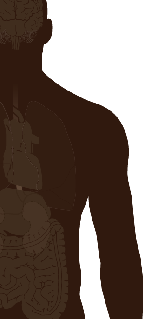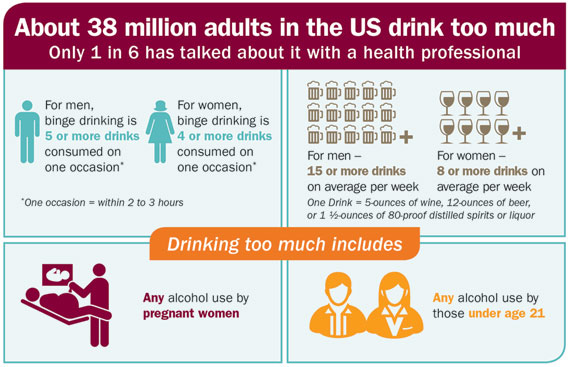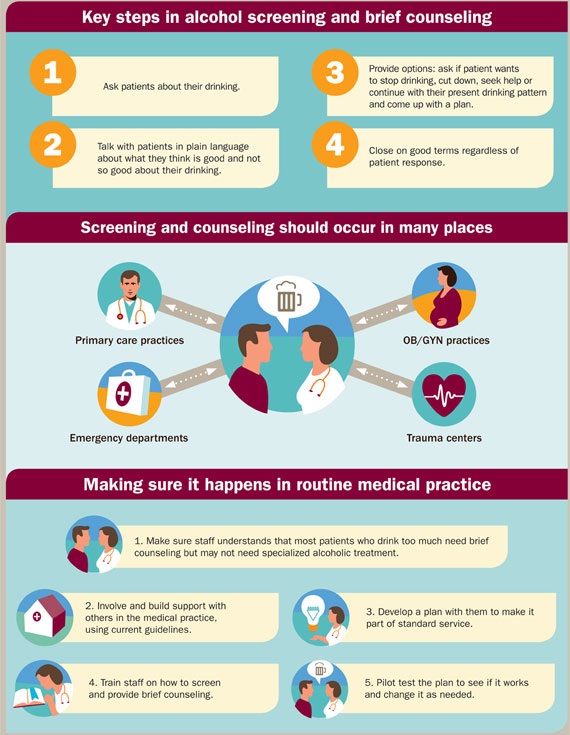Alcohol Screening and Counseling
An effective but underused health service
January 2014



38 Million
At least 38 million adults in the US drink too much.

1 in 6
Only 1 in 6 adults talk with their doctor, nurse, or other health professional about their drinking.

25%
Alcohol screening and brief counseling can reduce the amount consumed on an occasion by 25% in those who drink too much.
At least 38 million adults drink too much and most are not alcoholics. Drinking too much includes binge drinking, high weekly use, and any alcohol use by pregnant women or those under age 21. It causes about 88,000 deaths in the US each year, and costs the economy about $224 billion. Alcohol screening and brief counseling can reduce drinking on an occasion by 25% in people who drink too much, but only 1 in 6 people has ever talked with their doctor or other health professional about alcohol use. Talking with a patient about their drinking is the first step of screening and brief counseling, which involves:
- Using a set of questions to screen all patients for how much and how often they drink.
- Counseling patients about the health dangers of drinking too much, including women who are (or might be) pregnant.
- Referring only those few patients who need specialized treatment for alcohol dependence.
Doctors and other health professionals can use alcohol screening and brief counseling to help people who are drinking too much to drink less. The Affordable Care Act requires new health insurance plans to cover this service without a co-payment.
Doctors, nurses, and other health professionals should screen all adult patients and counsel those who drink too much.
Most adults have not talked with a doctor, nurse, or other health professional about how much they drink.
- Drinking too much is dangerous and can lead to heart disease, breast cancer, sexually transmitted diseases, unintended pregnancy, fetal alcohol spectrum disorders, sudden infant death syndrome, motor-vehicle crashes, and violence.
- Public health experts recommend alcohol screening and counseling should happen more often than it does. Yet, people report a doctor, nurse, or other health professional has rarely talked with them about alcohol, the important first step for addressing problems with drinking too much:
- Only 1 in 6 adults have discussed their drinking.
- Few binge drinkers (1 in 4) have talked about alcohol use. Binge drinking is defined as men drinking 5 or more alcoholic drinks or women drinking 4 or more, in about 2-3 hours.
- Even among adults who binge drink 10 times or more a month, only 1 in 3 have discussed drinking.
- Only 17% of pregnant women have talked about drinking.
- Most states had less than 1 in 4 adults who discussed their drinking. Washington, D.C. had the highest percentage with 25%.
Alcohol screening and brief counseling has been proven to work.
- It can reduce how much alcohol a person drinks on an occasion by 25%.
- It improves health and saves money just as blood pressure screening, flu vaccines, and cholesterol or breast cancer screening.
- It is recommended for all adults, including pregnant women.

Source: American Journal of Preventive Medicine, 2011; Volume 41.

Source: American Public Health Association and Education Development Center, Inc. (2008); Journal of Studies on Alcohol and Drugs, 2005 (66).
Federal government is
- Studying how to best achieve alcohol screening and counseling at federally qualified health centers.
- Requiring states with expanded Medicaid to cover a set of preventive services, including alcohol screening and counseling, through the Affordable Care Act.
- Adopting clinical guidelines to carry out alcohol screening and counseling.
- Teaching providers about billing and insurance coverage for alcohol screening and counseling services.
We know what works
The Guide to Community Preventive Services (Community Guide) recommends effective policies to prevent drinking too much. Learn more at: https://www.thecommunityguide.org/topic/excessive-alcohol-consumptionExternal
Health professional organizations can
- Tell doctors, nurses, and other health professionals how well screening and brief counseling works.
- Teach all health professionals how to do alcohol screening and counseling.
- Provide e-tools for doctors, nurses and other health professionals to deliver these services to patients.
States and Communities can
- Encourage health care plans and provider organizations to start screening and counseling.
- Monitor how many adults are receiving these services in communities.
- Consider alternative ways to deliver these services in state and community programs, using computers, smartphones, and other electronic devices.
- Help conduct community activities that reduce drinking too much.
Doctors, nurses, health plans, and insurers can
- Screen all adult patients for alcohol use as part of their usual services. Use current guidelines to do this effectively. Counsel, refer, and track those patients who need more help.
- Advise women not to drink at all if there is any chance they could be pregnant.
- Recruit and train nurses, social workers and health educators in a practice to screen and counsel all patients.
- Through insurers and employers, provide insurance coverage for alcohol screening and counseling.
Key points on alcohol consumption from the 2010 US Dietary Guidelines for Americans
- Don’t start drinking or drink more often because of potential health benefits.
- If you do choose to drink, do so in moderation. This is defined as up to 1 drink a day for women or 2 for men.
- Don’t drink at all if you are under age 21, pregnant or may be pregnant, or have health problems that could be made worse by drinking.
- Vital Signs Issue details: Communication Between Health Professionals and Their Patients About Alcohol Use — 44 States and the District of Columbia, 2011, Morbidity and Mortality Weekly Report (MMWR)
- Alcohol and Public Health
- Fetal Alcohol Spectrum Disorders (FASDs)
- Vital Signs – Alcohol Screening and Counseling? [PODCAST – 1:15 minutes]
- Vital Signs – Alcohol Screening and Counseling [PSA – 0:60 seconds]
- Public Health Grand Rounds – Preventing Excessive Alcohol Use: What Public Health Can Do
On Other Web Sites
- Dietary Guidelines – Advisory Committee report [PDF – 967KB]
- Screening, Brief Intervention, and Referral to Treatment (SBIRT) Services [PDF – 575KB]
- Coding for SBI Reimbursement
- Clinician pocket guide for Alcohol Screening and Brief Intervention [PDF – 575KB]
- Clinical Preventive Services Covered Under the Affordable Care Act
- MedlinePlus – Alcoholism
- MedlinePlus – Health Screening
- Too Much Alcohol: Making Screening and Counseling Routine
